Houthis claim to have used HYPERSONIC ballistic missile to strike central Israel for the first time
Yemen’s Houthi rebels claim they have fired a hypersonic ballistic missile into central Israel for the first time.
According to Yahya Sarea, the Houthis’ military spokesman, the fearsome missile was fired in just 11.5 minutes at a range of 2,040 km (1,270 miles), marking a major escalation by the Iranian-backed militias.
Although Israel said the missile missed its target and there were no casualties, Prime Minister Benjamin Netanyahu said Israel would impose a “high price” on the Houthis, who control northern Yemen.
Initially, it was said that the rocket had landed in an open area, but the Israeli military later said that the rocket had probably fragmented in the air and that pieces of interceptor missiles had landed in fields and near a train station.
Just before the impact, at around 6:35 a.m. local time (3:35 a.m. GMT), air raid sirens sounded in Tel Aviv and central Israel, causing residents to flee and take cover.
Yemen’s Houthi rebels have claimed to have fired a hypersonic ballistic missile to strike central Israel for the first time. Houthi military spokesman Yahya Sarea shared this photo of the apparent hypersonic missile today
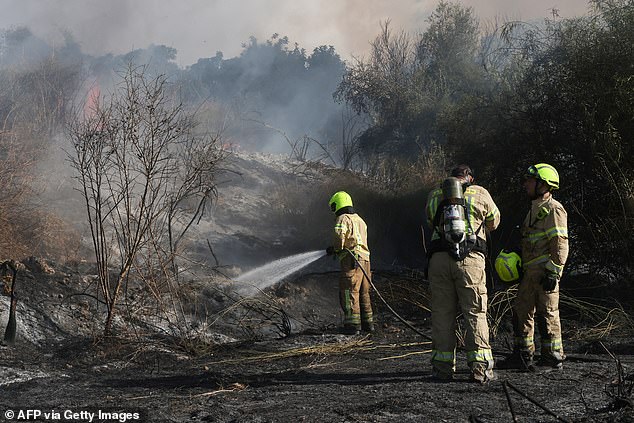
Houthis military spokesman Yahya Sarea said the fearsome missile was fired 2,040 km (1,270 miles) in just 11.5 minutes
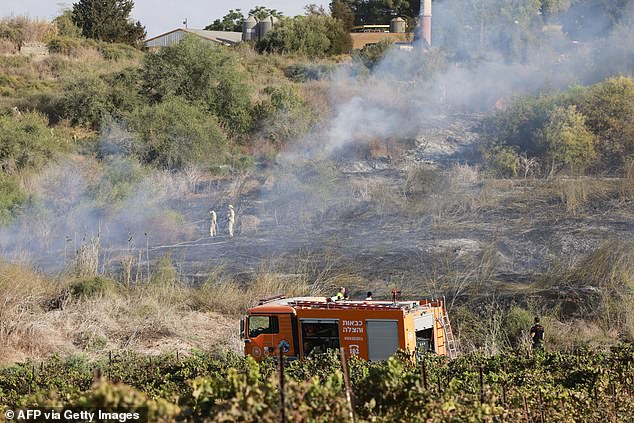
Emergency workers extinguished a fire in the area of Lod, near Tel Aviv, in central Israel, after the Houthis fired a rocket
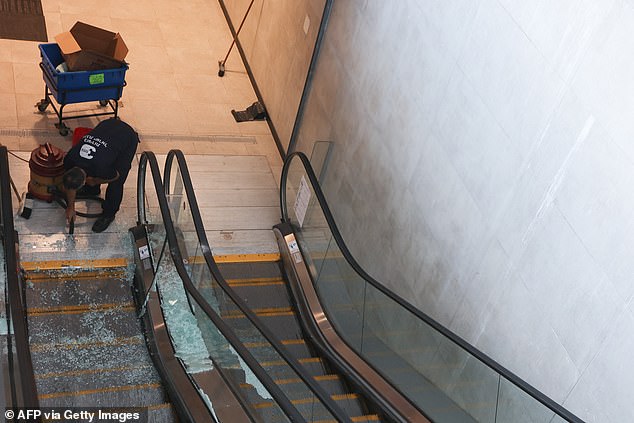
A worker sweeps broken glass from an escalator damaged by a missile fired from Yemen at a train station in the Israeli city of Modin
Loud bangs were heard as the rocket appeared to pierce Israel’s Iron Dome and Reuters saw smoke rising in an open field in central Israel.
During a weekly cabinet meeting nearly a year after the start of the war between Israel and Hamas, Netanyahu said the Houthis should have known that Israel would exact a “high price” for attacks on Israel.
“Anyone who wants to be reminded of that can visit the port of Hodeida,” Netanyahu said, referring to an Israeli airstrike on Yemen in July after a Houthis drone hit Tel Aviv.
The Houthis have repeatedly fired rockets and drones into Israel in solidarity with the Palestinians since the war in Gaza began with a Hamas attack on Israel in October.
The drone that first struck Tel Aviv in July killed one man and wounded four. Israeli airstrikes in response to Houthi military targets near the port of Hodeidah killed six and wounded 80 people.
So far, Houthi missiles have not penetrated deeply into Israeli airspace. The only missile to hit Israeli territory fell in March in an open area near the Red Sea port of Eilat.
Israel can expect more strikes in the future “as the first anniversary of the October 7 operation approaches, including in response to the aggression against the city of Hodeidah,” Sarea said.
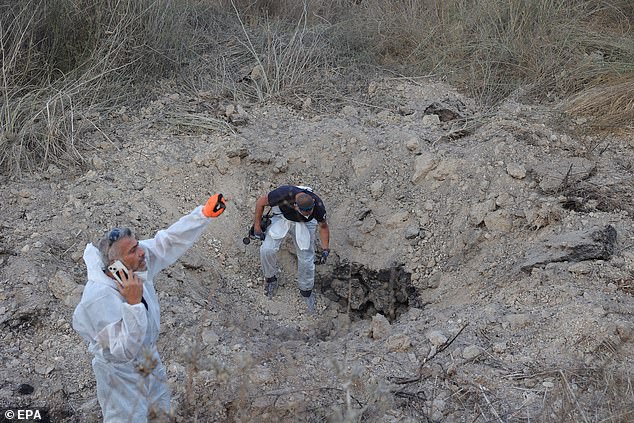
The Israel Police Bomb Disposal Unit investigates the site of a rocket attack near Kfar Daniel, central Israel

Smoke clouds after rocket attack from Yemen in central Israel
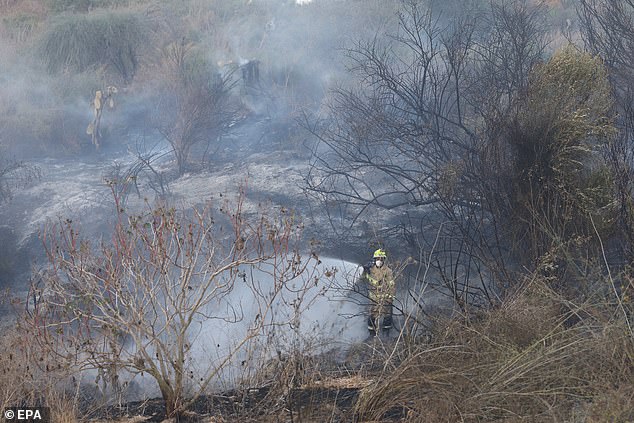
A firefighter extinguishes a fire that broke out after Houthis claimed to have fired a hypersonic missile
The deputy head of the Houthis’ media office, Nasruddin Amer, wrote in a report on X on Sunday that the rocket reached Israel after “20 rockets failed to intercept it,” calling it “the beginning.”
He added: ‘The distance of 2,040 km was covered in 11.5 minutes and fear and panic arose among the Zionists, as more than two million Zionists, for the first time in the history of the Israeli enemy, fled to shelters.
“The geographical challenges, the US-British aggression and the systems of surveillance, spying and eavesdropping will not prevent beloved Yemen from fulfilling its religious, moral and humanitarian duty in solidarity with the Palestinian people.”
The Israeli military also reported that 40 projectiles were fired from Lebanon into Israel on Sunday, which were intercepted or landed in open areas.
“There were no injuries,” the military said.
The announcement comes amid fears that Russia has transferred secrets about nuclear bombs to Iran in exchange for missiles to be used on Ukraine.
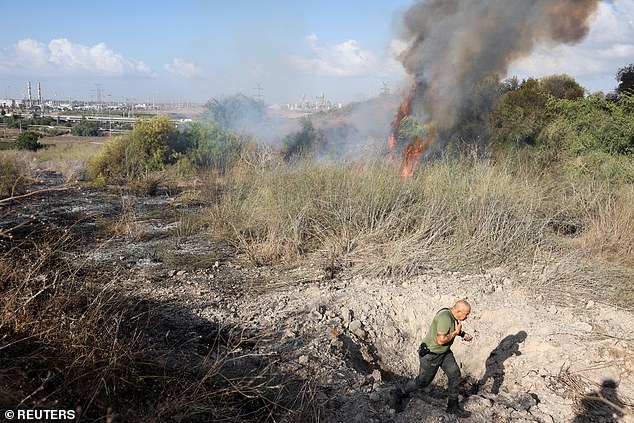
A man in a crater runs away as smoke rises and flames erupt behind him
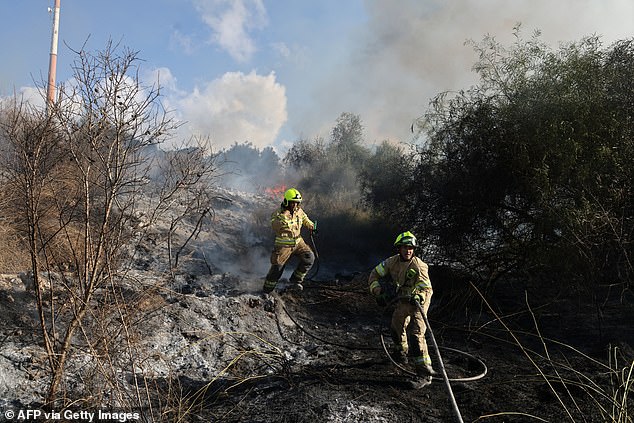
Emergency workers have extinguished a fire in the area of Lod, near Tel Aviv, in central Israel
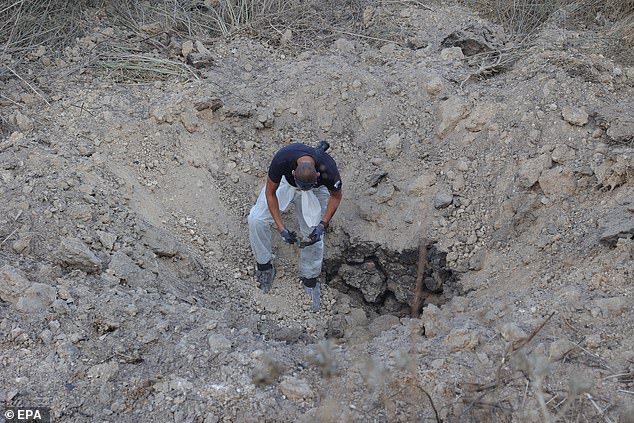
The Israel Police Bomb Disposal Unit investigates the scene of a ground-to-ground rocket impact near Kfar Daniel
The terrifying prospect was discussed during a meeting between US President Joe Biden and British Prime Minister Keir Starmer at the White House on Friday.
If the deal is confirmed, it will raise major concerns as Tehran seeks to continue its uranium enrichment program as a step toward developing a nuclear weapon.
British sources said alarm bells were being raised over Iran’s trade in nuclear technology, a move feared to be part of an increasingly close alliance between Tehran and Moscow.
Last week, the US and UK released key information revealing that Russian President Vladimir Putin had accepted a shipment of Fath-360 ballistic missiles from Iranian Supreme Leader Ali Khamenei.
After the speech, US Secretary of State Anthony Blinken shared a chilling warning during a visit to London with his British counterpart, David Lammy.
“Russia, in turn, shares technology that Iran wants. It’s a two-way street, including on nuclear issues and also some space information,” Blinken said, suggesting that Russia and Iran are engaged in destabilizing activities with global implications.
